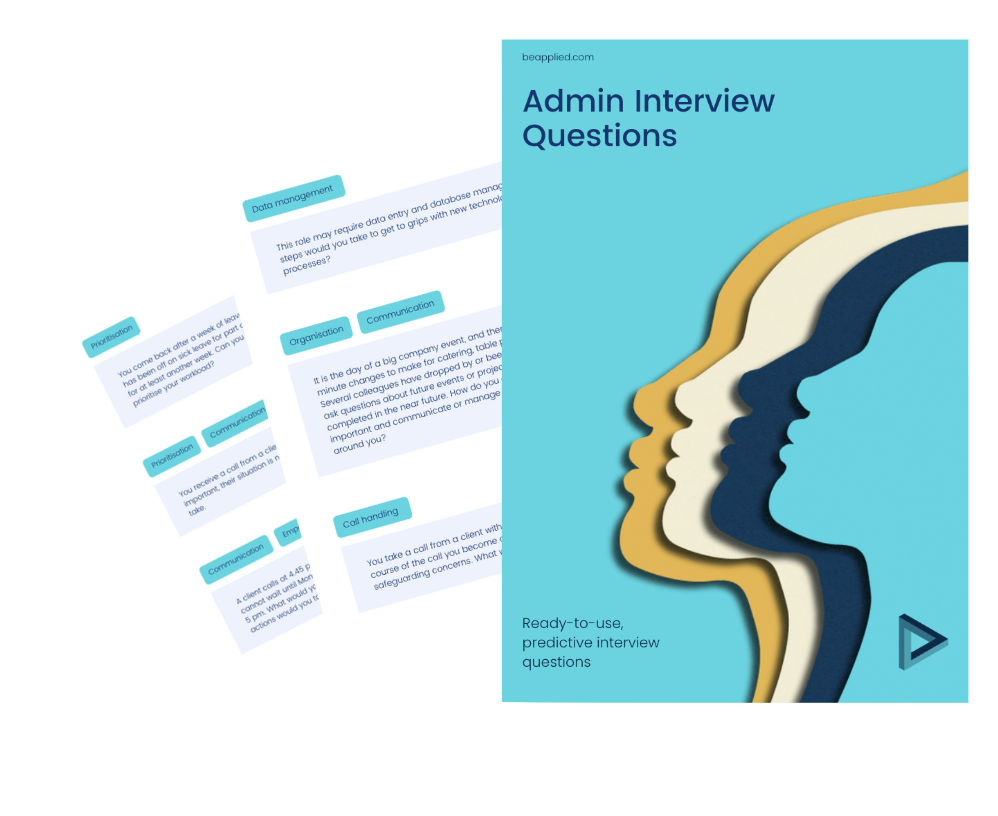Admin Interview Questions

About this role
Administrators are typically responsible for the running of offices - managing clerical tasks and projects.
Admin responsibilities
- Organising and storing information.
- Taking phone calls and managing emails.
- Greeting visitors at reception.
- Scheduling meetings and booking rooms.
- Arranging travel and accommodation for employees.
- Overseeing deliveries and supplies.
What skills should you be looking for?
A client calls at 4.45 pm on a Friday with an urgent need that they say cannot wait until Monday. Our office is due to close for the weekend at 5 pm. What would your approach be to the situation, and what actions would you take?
It is the day of a big company event, and there are several last-minute changes to make for catering, table plans, and programmes. Several colleagues have dropped by or been in touch to check in and ask questions about future events or projects that need to be completed in the near future. How do you decide what is most important and communicate or manage expectations for those around you?
You have been planning a company event for 250 people at a hotel. One week before the seminar is due to take place, you find a voicemail and an email from the hotel telling you that they have double-booked the conference room. They offer you a slightly smaller room that will seat 230 in a partner venue nearby. What actions do you take?
This role may require data entry and database management. What steps would you take to get to grips with new technology and processes?
You take a call from a client with a request for assistance. During the course of the call you become aware that there are some significant safeguarding concerns. What would be your course of action?
What are structured interview questions?
Structured questions (or work samples) are highly predictive, job-specific questions designed to simulate parts of a job.
Structured work sample questions are the most predictive form of assessment you can use. Why? Because they directly test for skills by asking candidates to think as if they were already in the job.
Diversity
Testing for skills instead of just experience makes interviews a more inclusive process. 60%+ of candidates hired through our process would've been missed using CVs/traditional interviews - most of whom are from underrepresented groups.
Accuracy
By simulating tasks that would realistically occur in the role, you can see how candidates would think and work should they get the job.What could be more predictive than having candidates do small parts of the job before actually getting it?
Candidate experience
Candidates genuinely enjoy being given a chance to showcase their ability - this is why we have a 9/10 average candidate experience rating (including unsuccessful candidates).

Decide on the skills you’re looking for
Choose 6-8 core skills required for success in the role. These can be a mix of hard, technical skills as well as soft skills and general working characteristics.You could also include one or two of your organisation's most relevant values.
Think of scenarios that would test these skills
Next, come up with either everyday tasks or rarer, more challenging scenarios that would test some of these skills. They can be day-to-day duties, bigger projects or specific dilemmas that a candidate may realistically face. Should they get the job.
Pose scenarios hypothetically to create your questions
Instead of your typical ‘tell me a time when’ questions, ask candidates what they would do if faced with a given scenario.It's not that experience doesn't have any value… it's just more predictive to test directly for skills, without making assumptions based on background.
Give yourself scoring criteria
Want to make more data-driven hiring decisions? Score candidates against set criteria.We’d recommend starting out with a simple 1-5 star scale and a few bullet points noting what a good, mediocre and bad answer might include.

Use review panels
Having team members join your interviews will result in fairer, more accurate scores.Three is the magic number - you’ll start seeing diminishing return after that

.svg)